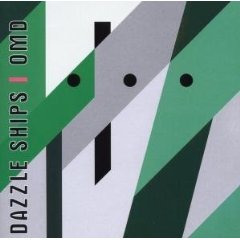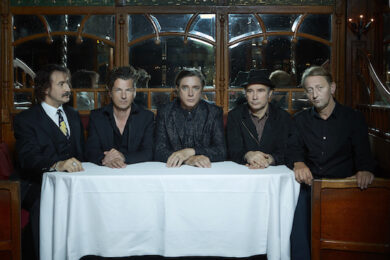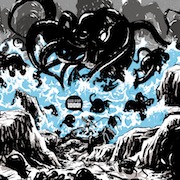In 1983, human civilisation came closer to disappearing in a compost heap of gracefully rising mushroom clouds than at any point since the Cuban Missile Crisis. In March, the month that Dazzle Ships was released, President Regan gave the speech in which he called the Soviet Union the "evil Empire", days later announcing the infamous Strategic Defence Initiative. Behind the scenes, psychological warfare missions by NATO forces probed the Soviet defences, with bombers approaching restricted airspace before turning back at the last minute. In September the USSR shot down Korean Air flight 007, and at the end of the year NATO’s Exercise Able Archer was interpreted by the Soviets as a preparation for a pre-emptive nuclear strike, prompting them to place their forces on full alert.
After the astounding reception afforded to Architecture and Morality in 1981, Dazzle Ships was a commercial and critical failure for OMD. Yet it stands the test of time as a heroic statement, succeeding, from the tinny brass opening of ‘Radio Prague’ onwards, in walking a tightrope of arch camp aesthetics and a seriously-minded, yet ludicrously overblown experiment. Try reading Andy McCluskey’s lyrics in hard print and they at times feel as empty as a wide horizon. But when harnessed to the deeply elegiac melodies (those rich synth tones, slow-marching drums), and a battery of sounds evocative of war at sea and radio propaganda, the whole comes alive with undeniable panache.
Of course, it was never going to sell, no matter how exuberant a pop song ‘Telegraph’ might be. Cold War geopolitics appear in ‘International’, which opens with a news report telling of a girl from Nicaragua whose hands had been cut off at the wrists. ‘ABC Auto-Industry’, meanwhile, features a Czechoslovakian radio programme on the use of robots in factories. ‘Dazzle Ships (Parts II, III And VII)’ is a three part instrumental composed of the soundtrack samples of conflict above and below the waves, foghorns and sonar pings, the throbbing of engines heard underwater. This is followed by the preposterously-titled ‘Romance Of The Telescope’ with its dreamy elegance and chorus of processed voices. ‘Silent Running’ is so magisterially pompous it demands a half hour of enforced standing ovation, the first one to stop getting a firm hand on the shoulder on the way out of the State Opera.
When I saw the reunited OMD perform Architecture and Morality last year, they followed that set with a slew of greatest hits that included not one track from Dazzle Ships. Instead, the audience (who had remained subdued during the Architecture section of the evening) piled to the front for the suburban disco; ‘Tesla Girls’, ‘Sailing On The Seven Seas’ and so on. Perhaps this reissue might go some way to redress the balance. Dazzle Ships was a fine realisation of that desire to be both pop and important that OMD first hinted at with ‘Enola Gay’ and ‘Electricity’. It was also, like the brightly painted vessels that gave the album its name, an idea that on paper should never really have worked. And more than that, a quarter of a century on it remains as a musical microfiche that almost unconsciously documents the underlying tensions of its era.
Orchestral Manoeuvres In The Dark – ‘Telegraph’ video:









